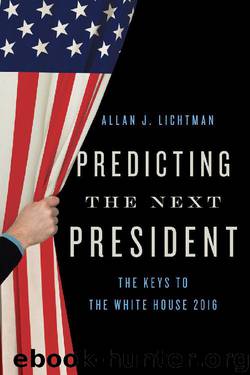Predicting the Next President by Allan J Lichtman

Author:Allan J Lichtman [Lichtman, Allan J]
Language: eng
Format: epub
ISBN: 9781442269200
Publisher: Rowman & Littlefield Publishers
Published: 2016-05-01T17:00:00+00:00
In taking the oath of office for the second time in 1937, Franklin Roosevelt became the first president to be inaugurated after the Twentieth Amendment had changed the traditional March 4 inauguration date to January 20. After four years of recovery from the trough of the depression in March of 1933, Roosevelt believed that the control of inflation and the restoration of business confidence now required balanced budgets and monetary restraint. The administration ceased pushing the Federal Reserve Board to expand the money supply and cut back sharply on WPA relief and public-works projects. Late in the inaugural year, the economy began to slide. The decline, which continued until mid-1938, was one of the most brutal in the nation’s history. By early spring of 1938, the unabated crisis finally had convinced FDR that federal initiatives were needed to stimulate the economy. The president steered major relief and public-works appropriations through Congress, expanding consumer demand and helping to reignite the economy. (The experience ultimately led Roosevelt to modify his orthodox views and to accept, at least tacitly, both deficit spending and monetary expansion as proper means of promoting economic growth.) By mid-year the contraction had halted, but it resulted in a 6 percent decline in real per-capita GNP for 1938.
Beset with economic problems and divided over the future of the New Deal, the Democrats lost seventy House seats in the congressional elections of 1938, reducing their majority from 76 percent to 60 percent and forfeiting mandate key 1. Roosevelt found it difficult to control the new Congress. His attempt to purge conservatives from party ranks in the 1938 primaries had weakened the fragile alliance between the Democrats’ northern and southern wings, contributing to the emergence of a “conservative coalition” of Republicans and southern Democrats.
Halfway through Roosevelt’s second term, the Democrats’ prospects for reelection in 1940 looked doubtful. Mandate key 1 was down, and sentiment against a third Roosevelt term augured the possible loss not only of incumbency key 3 but also of contest key 2 and charisma key 12. The recent “Roosevelt depression” had put long-term economy key 6 in jeopardy, the administration had effected no major new policy innovations, and it had yet to make a mark in foreign or military policy.
Although the conservative coalition in Congress blocked major Roosevelt initiatives, including far-reaching proposals for reorganizing the federal government and expanding its capacity to engage in comprehensive national planning, the president did win passage of several important new programs. These included minimum-wage and maximum-hour legislation, the creation of a federal housing authority, a revised Agricultural Adjustment Act, and a reorganization bill creating the Executive Office of the President. The Democrats secured policy-change key 7, however, only through unprecedented military-preparedness measures undertaken late in the term, as Europe appeared poised to fall to Nazi aggression.
Civil disorder had bubbled to the surface in 1937 as the newly formed CIO challenged some of the nation’s largest and most powerful corporations. Although some deadly violence resulted, these were isolated incidents in what was otherwise
Download
This site does not store any files on its server. We only index and link to content provided by other sites. Please contact the content providers to delete copyright contents if any and email us, we'll remove relevant links or contents immediately.
The Secret History by Donna Tartt(18963)
The Social Justice Warrior Handbook by Lisa De Pasquale(12171)
Thirteen Reasons Why by Jay Asher(8856)
This Is How You Lose Her by Junot Diaz(6843)
Weapons of Math Destruction by Cathy O'Neil(6223)
Zero to One by Peter Thiel(5742)
Beartown by Fredrik Backman(5688)
The Myth of the Strong Leader by Archie Brown(5472)
The Fire Next Time by James Baldwin(5392)
How Democracies Die by Steven Levitsky & Daniel Ziblatt(5181)
Promise Me, Dad by Joe Biden(5118)
Stone's Rules by Roger Stone(5058)
A Higher Loyalty: Truth, Lies, and Leadership by James Comey(4919)
100 Deadly Skills by Clint Emerson(4888)
Rise and Kill First by Ronen Bergman(4744)
Secrecy World by Jake Bernstein(4709)
The David Icke Guide to the Global Conspiracy (and how to end it) by David Icke(4664)
The Farm by Tom Rob Smith(4475)
The Doomsday Machine by Daniel Ellsberg(4461)
